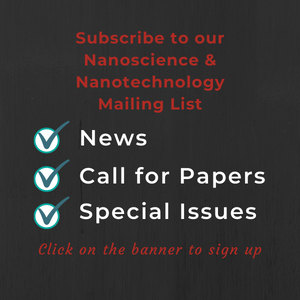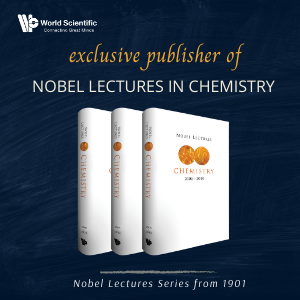Chemistry and Material Sciences naturally depend greatly on Synthesis as the initial stage for the existence of compounds and materials with desired behaviors, within the overall streamline of Design/Synthesis — Properties — Application/Function, and their relations. Such a general approach is of a too wide scope to be properly treated in a single set of publications, but this one on "Synthesis and Applications in Chemistry and Materials" restricts itself by aiming to show the strength and international character of the current research in synthetic chemistry that is being developed in Portugal or abroad by teams that cooperate with this country. Hence, it gathers representative contributions of main Portuguese research groups and foreign collaborating ones. Nevertheless, the topic should be understood in a wide sense, being open to types of studies with significance on sustainable synthesis and applications in chemistry, materials and/or related sciences.
Sample Chapter(s)
Preface
36: Heterogeneous Catalysis in the Circularity of Plastic
Contents:
- Part VIII — Biomass Valorisation:
- Bioenergy in Portugal (Ana P C Ribeiro, Roberta Bertani, Mirto Mozzon, Paolo Sgarbossa and Pellegrino Conte)
- Zeolitic Catalysts for Carbohydrate Biomass-Related Conversion Processes (Margarida M Antunes and Anabela A Valente)
- Part IX — Plastic Waste Valorisation and Degradable Materials:
- Heterogeneous Catalysis in the Circularity of Plastic (M A N D A Lemos, T Godinho and F Lemos)
- Catalytic Advances in the Valorization of Biomass Resources and Plastic Waste (Ana C Fernandes)
- Hydrocracking of Plastics: A Pathway for Chemical Recycling (Cátia S Costa, M Rosário Ribeiro and João M Silva)
- Progressive Metal Complex Catalysts for Ring-Opening Polymerization of Cyclic Esters (Wenjuan Zhang and Wen-Hua Sun)
- Part X — Functional Materials:
- Functional Polymer-Based Nanostructured Materials (José Paulo Farinha, Carlos Baleizão and José Manuel Gaspar Martinho)
- Luminescence in Tetracoordinate Boron Complexes of Iminopyrrolyl Ligands (Clara S B Gomes, Devarajan Suresh and Pedro T Gomes)
- Clever Strategies to Broaden Polyoxometalates Functionalities: From Molecular Units to Hybrid Composites (Carlos M Granadeiro, Luís Cunha-Silva and Salete S Balula)
- Part XI — Photocatalytic Materials:
- Sustainable Synthesis of Oxides for Electronics and Photocatalysis (R Branquinho, E Carlos, D Nunes, E Fortunato and R Martins)
- Sustainable Photocatalytic Synthesis Assisted by Optical Semiconductors (Maria J Sampaio, Joana C Lopes, Dânia S M Constantino, Cláudia G Silva and Joaquim L Faria)
- Heterogeneous Fenton-Like Degradation of Oxytetracycline by Ti-Doped SrFeO₃ (Maria João Nunes, Ana Lopes, Maria José Pacheco, Jaime Carbajo, Jefferson E Silveira, Juan A Zazo, Jose A Casas, Annabel Fernandes and Lurdes Ciríaco)
- Part XII — Energy Storage and Conversion:
- Biomass-Derived Carbon Materials for Sustainable Energy Storage and Conversion (Natalia Rey-Raap, José Luís Figueiredo and M Fernando R Pereira)
- Electrochemical Synthesis of Porous Materials for Catalysis (M F Montemor, A Adán-Más and P Arévalo-Cid)
- Part XIII — Supercritical Fluid Systems:
- Supercritical CO₂ as Green Solvent for Sustainable Synthesis and Catalysis (Ana V M Nunes, Malgorzata E Zakrzewska, Ana B Paninho, Catarina I Melo, Luís C Branco and M Nunes da Ponte)
- Catalysts Preparation: A Supercritical Route (Luis C S Nobre, Beatriz P Nobrea, Carlos A Nieto de Castro and António M F Palavra)
- Supercritical Fluid Extraction of Compounds from Microalgae and Aromatic Plants (Beatriz P Nobre, António M F Palavra and José P Coelho)
Readership: Graduate students and researchers in coordination chemistry, nanomaterials, enzymatic and organic systems, metal complex catalytic systems and materials, biomass and waste valorisation, energy conversion and supercritical systems.
Armando J L Pombeiro is Full Professor Jubilado at the Instituto Superior Técnico, Universidade de Lisboa (ULisboa), Distant Director at the RUDN University (Moscow), Full Member of the Academy of Sciences of Lisbon (where he was in charge of various positions, e.g., Secretary-General and Vice-President of the Class of Sciences) and Fellow of the European Academy of Sciences (EurASc) and Member of the Academia Europaea.
Founding President of the College of Chemistry of the ULisboa, former Coordinator of Centro de Química Estrutural and of its thematic line Synthesis and Catalysis, coordinator of the Coordination Chemistry and Catalysis group, founding Director of the PhD Program on Catalysis and Sustainability (CATSUS), co-founder of the Portuguese Electrochemical Society (former President) and of the Iberoamerican Society of Electrochemistry (SIBAE).
He chaired various major international conferences, such as the 25th International Conference on Organometallic Chemistry (ICOMC 2012), the 7th EuCheMS Conference on Nitrogen Ligands (2018), the 1st International Conference on Non-Covalent Interactions (ICNI 2019) and the 22nd International Symposium on Homogeneous Catalysis (ISHC 2022). He was(is) member of organizing or scientific committees of over 40 international conferences or schools.
His research addresses the activation of small molecules with industrial, environmental or biological significance, including: (i) metal-mediated synthesis and catalysis under mild/sustainable conditions (e.g., functionalization of alkanes, water oxidation, water in catalysis, alcohols and ketones oxidations, C-C couplings, CO2 utilization; catalysis in water, in ionic liquids, in supercritical medium, under microwaves, mechanochemical conditions, and/or metal-free); (ii) crystal engineering of coordination compounds, design and self-assembly of polynuclear and supramolecular structures (e.g., coordination polymers and MOFs); (iii) non-covalent interactions in synthesis; (iv) metal-ligand cooperation; (v) coordination compounds with anti-tumor and anti-bacterial activity; (vi) molecular electrochemistry; (vii) theoretical studies.
He authored one book, edited 8 books, (co-)authored ca. 950 research publications, ca. 40 patents, and presented ca. 120 invited plenary and keynote lectures at international conferences.His work has received ca. 29 thousand citations (ca. 12 thousand citing articles), h-index ca. 80 (Web of Science, 2022).
Among his honors, he was awarded Honorary Professorship by the St. Petersburg State University (Institute of Chemistry), Invited Chair Professorship by the National Taiwan University of Science & Technology, the inaugural SCF French-Portuguese Prize by the French Chemical Society, the Madinabeitia-Lourenço Prize by the Spanish Royal Chemical Society, the Vanadis Award, the Prizes of the Portuguese Chemical and Electrochemical Societies, the Scientific Prizes of the Technical ULisboa (inaugural) and of the ULisboa. In his honor, Special Issues of Coord. Chem. Rev. and J. Organometal. Chem. were published, and a symposium was held (Univ. of Oviedo, Spain).
Kamran T Mahmudov was born in Azerbaijan, and received his BSc (2001), MSc (2003), PhD (2007) and Habilitation (2013) degrees at the Baku State University, where he worked as an Assistant Professor (2006–2008). He conducted a postdoctoral research under supervision of Prof. A J L Pombeiro at the University of Lisbon (2009–2018). Currently, he is a researcher at the Instituto Superior Tecnico, University of Lisbon. Dr Mahmudov has authored or co-authored over 140 papers in ISI journals (>4000 citations, average citations per item 28.45; h=44), 11 reviews, 1 perspective, 9 book chapters, and he is co-editor of 2 books on noncovalent interactions. KM is co-founder and Secretary of International Conferences on Noncovalent Interactions (ICNI) series, member of its International Advisory Board and co-Chairperson of the first one which was held on 2-6 September 2019 in Lisbon. He has served as a guest co-editor for the special issues: i) Coordination Compounds and Catalysis dedicated to 70 Years Anniversary of Prof. Pombeiro (Coord. Chem. Rev. 2019–2020); ii) "1st International Conference on Noncovalent Interactions", RSC journals, 2019; iii) "XXII International Symposium on Homogeneous Catalysis" to be published in Chemistry Europe journals in 2022. Currently he is focusing his research on the use of noncovalent interactions in synthesis, catalysis and design of materials.
Maria de Fátima Costa Guedes da Silva is Associate Professor (with Habilitation) at Instituto Superior Técnico (IST), Universidade de Lisboa, President of the Portuguese Electrochemical Society, Correspondent Member of the Academy of Sciences of Lisbon (ACL) and Fellow of the European Academy of Sciences (EURASC). She is the (co)-Coordinator of the Coordination Chemistry and Catalysis research Group at Centro de Química Estrutural (IST). Her research activity follows a general streamline that usually starts with the design and synthesis of novel coordination compounds, then evolving to their eventual application by exploring structure-properties (including reactivity) - function (application) relationships. Her main research interests include: structural determination, by X-ray diffraction analysis, of metal complexes and organic compounds, metal polynuclear assemblies and supramolecular structures; non-covalent interactions; activation, by transition metal centres, of small molecules with biological, pharmacological, environmental or industrial significance; metal mediated synthesis and catalysis; molecular electrochemistry and electrocatalysis; mechanistic investigation of fast reactions mainly by digital simulation of cyclic voltammetry. Co-Edited 2 books (Noncovalent Interactions in Catalysis, Royal Society of Chemistry, 2019; Alkane Functionalization, J Wiley & Sons, 2019), co-authored 17 book chapters and 390 research publications (ca. 10,000 citations, h ca. 60) and 13 patents. She was awarded the Scientific Prize Universidade de Lisboa / Caixa Geral de Depósitos (2017), as the scientifically most productive member of this University in Chemical and Chemical Engineering Sciences in the last quinquennial; the Scientific Prize of the Portuguese Electrochemical Society (SPE2013) by this Society within the celebrations of its 30 years anniversary, recognizing the scientific achievements in the Electrochemistry science and the role played for the development of the Society; the Excellence in Teaching Diploma, IST (since 2017).






